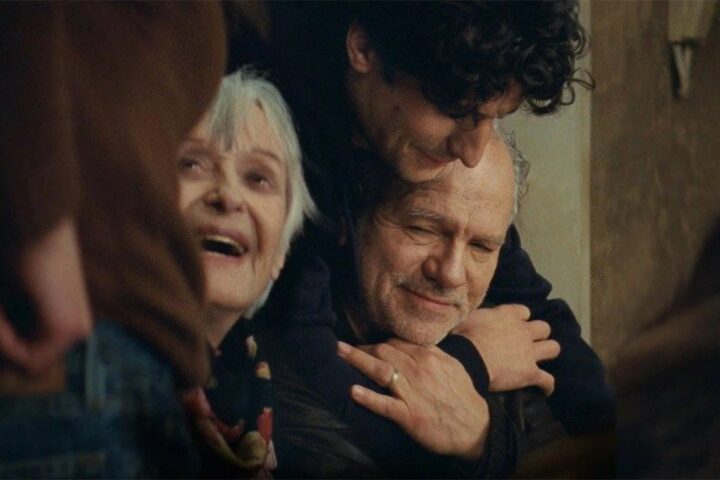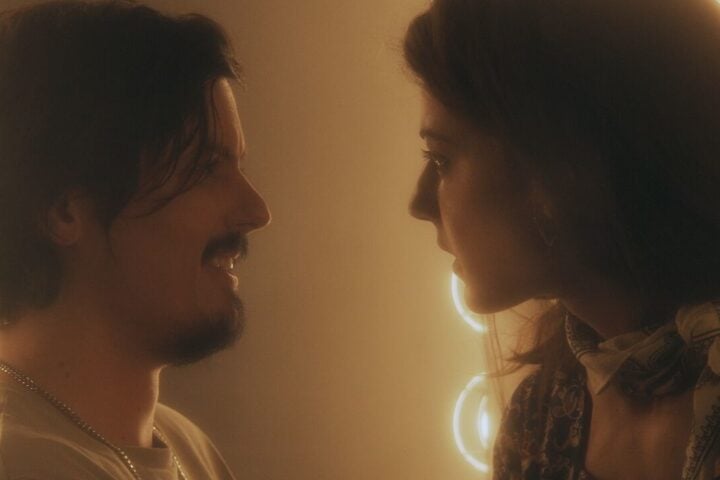In Whitney Horn and Lev Kalman’s farcical Dream Team, No (Esther Garrel) and Chase (Alex Zhang Hungtai), a pair of Interpol detectives as feckless as they are sexy, investigate a spate of surreal murders in Mexico. In this case, the murder weapon, if not the prime suspect, is a coral that emits a roseate, venomous gas. Disciples, apparently, of the Agent Cooper school of policework, these soft-boiled detectives try to solve the mystery through a combination of dream analysis, meditation, hitting the gym, getting seduced by their informants, and pondering the nature of consciousness. If all this sounds a little inane, that’s by design.
Where shows of the Peak TV era, like Mad Men and Breaking Bad, tried to look and feel more cinematic, Dream Team is cinema taking its cue from TV—even if it’s theoretically in service of the cinematic avant-garde. The film is defined by stilted acting and an episodic structure. The title and even the credits recur gratuitously on screen, following nonexistent commercial breaks. This segmentation allows for a collaging of disparate genres, channel surfing between New Age crime procedural, burlesque melodrama, Jacques Cousteau-style oceanography documentary, reggaeton music video, and, most incongruously, aerobics show.
Throughout, Horn and Kalman find a sort of dream logic in the slapdash contingencies of serialized low-budget production. With only a gesture at coherent plot or character development, Dream Team’s real preoccupation is its editing and cinematography. The dream sequences abound in experimental techniques, from impressionistic superimpositions to reversed shots, close-ups in disorienting montage to overlong, non-sequitur establishing shots.
The original mystery vanishes anticlimactically with the last “episode,” as a new cast of characters is introduced—as if Garrel and Huntai had abandoned the production and been hurriedly written out of the script—and Dream Team ends with the promise of future episodes. The film’s overall stance is one of post-ironic feigned ineptitude, as though its experimentalism, like the puns that litter the dialogue, were stumbled into: “Stroke my ass,” Chase scoffs, after No reads aloud the first victim’s toxicology report, which suggests a stroke as the cause of death.
This nonsense is all very charming, but the fetishistic re-staging of quaint technologies and genres like so many tchotchkes has long since become routine in our culture. Dream Team is just another instance where the “experimental” is no longer a method for making anything new, but a set of aesthetic ticks that signal a genre, or at best a meta-genre.
To all appearances, the filmmakers share the glib nihilism expressed by a lingerie-clad coral expert, Dr. Veronica Beef (Minh T Mia), when she says, “Hey, we all go extinct eventually.” Instead of answering this sentiment with the liberatory provocations of Albert Camus, or even the mordant despair of a Dogtooth-era Yorgos Lanthimos, Dream Team’s absurdist brand flirts instead with an art-for-art’s-sake disengagement: the meaningless void as light entertainment, yet another opportunity for burying our heads in the sand.
Since 2001, we've brought you uncompromising, candid takes on the world of film, music, television, video games, theater, and more. Independently owned and operated publications like Slant have been hit hard in recent years, but we’re committed to keeping our content free and accessible—meaning no paywalls or fees.
If you like what we do, please consider subscribing to our Patreon or making a donation.




